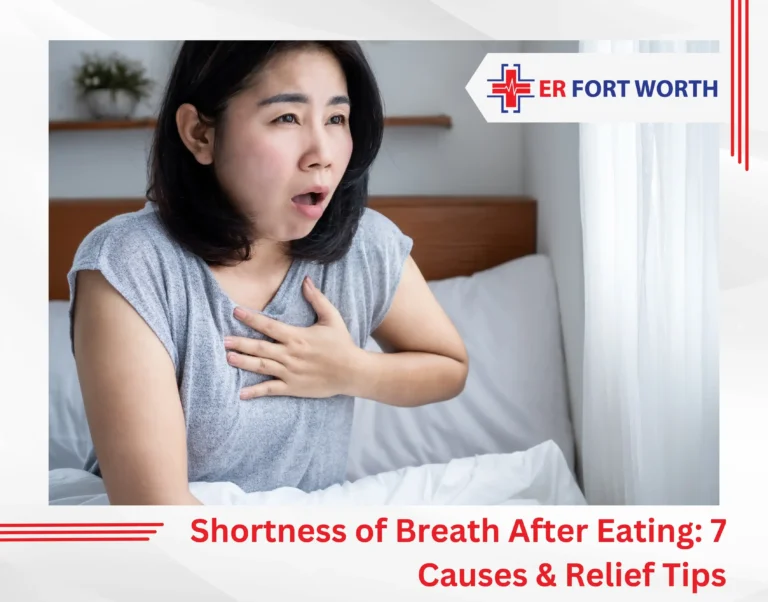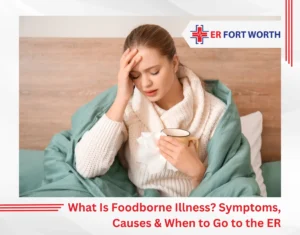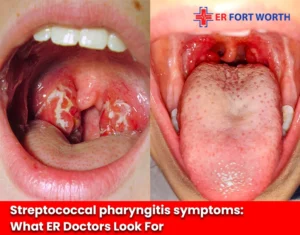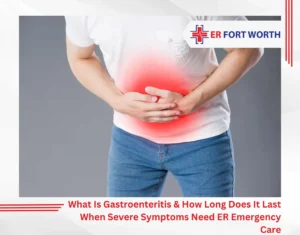Experiencing shortness of breath after eating can feel unsettling and even alarming. While it may be easy to dismiss as a one-time occurrence, persistent post-meal breathing difficulty can indicate underlying health concerns.
Fortunately, identifying potential causes and adopting targeted relief strategies can significantly enhance your quality of life.
Let’s dive into the reasons why you might feel breathless after meals and what you can do to manage or prevent it naturally and effectively.
What Does Shortness of Breath After Eating Feel Like?
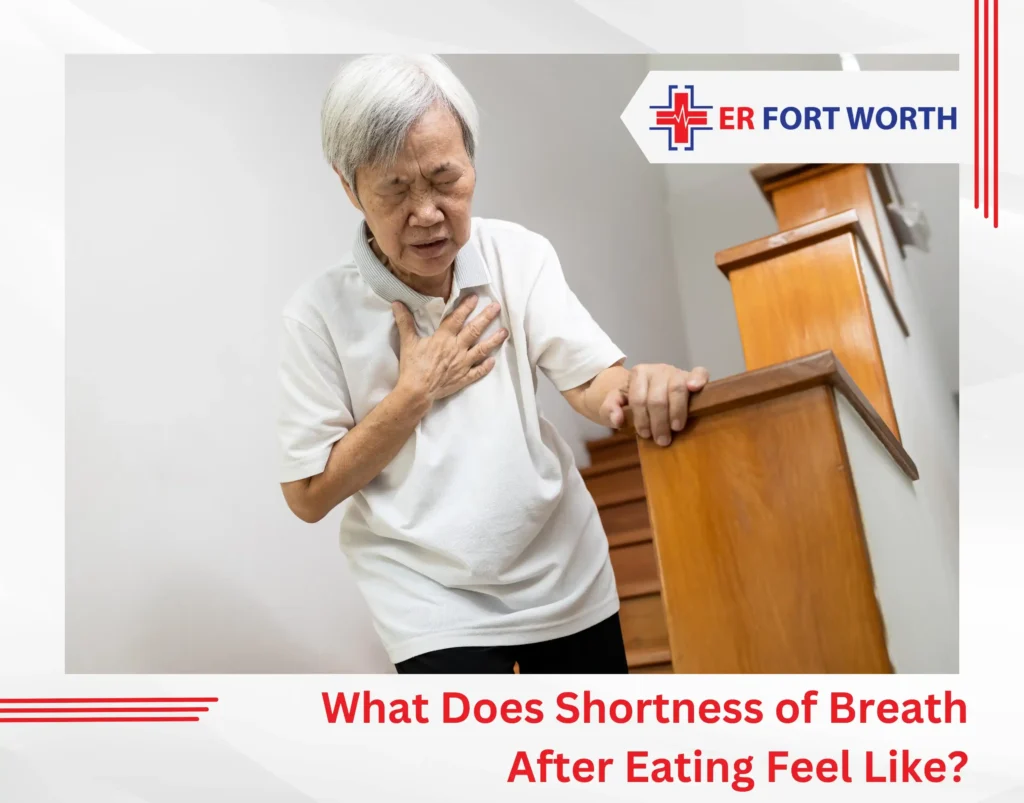
Shortness of breath after eating can manifest differently from person to person. Common sensations include:
- Feeling like you can’t take a full breath
- Chest tightness or pressure
- Shallow, rapid breathing
- Fatigue or lightheadedness after meals
- A general sense of being winded or out of breath
These symptoms might appear immediately after eating or develop gradually, depending on your body’s reaction to specific foods or underlying medical conditions.
7 Common Causes of Shortness of Breath After Eating
1. Overeating
Consuming large meals causes your stomach to expand, pushing against the diaphragm and limiting lung expansion. This pressure can make it more difficult to breathe, especially if you’re already prone to breathing issues.
Relief Tip: Eat smaller meals spaced throughout the day. Chew your food slowly and stop eating when you feel about 80% full.
2. Acid Reflux or GERD
Gastroesophageal reflux disease (GERD) can cause acid to rise into the esophagus. This can trigger inflammation and irritation that leads to shortness of breath, particularly when lying down shortly after eating.
Relief Tip: Avoid spicy, fatty, and acidic foods. Don’t recline for at least 30-60 minutes after eating.
3. Food Allergies and Intolerances
Some individuals may have mild to moderate allergic reactions or food intolerances that cause airway constriction, digestive discomfort, and breathlessness.
Relief Tip: Keep a detailed food journal to identify any suspicious items and consult an allergist for testing and guidance.
4. Hiatal Hernia
A hiatal hernia happens when the stomach protrudes through the diaphragm into the chest cavity, disrupting normal digestion and lung function.
Relief Tip: Stick to smaller, softer meals. Elevate your upper body while sleeping and consider medical evaluation for long-term management.
5. Obesity
Carrying excess weight, especially around the abdomen, can add pressure on the diaphragm and lungs. When you eat a large meal, this pressure increases further, reducing lung capacity.
Relief Tip: Focus on gradual, sustainable weight loss through a healthy diet and physical activity. Even modest weight loss can ease breathing.
6. Gastroparesis
In this condition, the stomach doesn’t empty properly, causing food to sit longer and produce gas, bloating, and pressure all of which can contribute to breathlessness.
Relief Tip: Eat low-fat, low-fiber, and soft foods in smaller portions. Talk to your doctor about medications that help with stomach motility.
7. Heart or Lung Conditions
Underlying medical conditions such as heart failure, asthma, COPD, or pulmonary hypertension can make you more vulnerable to breathlessness, especially after meals.
Relief Tip: If shortness of breath is accompanied by chest pain, dizziness, fatigue, or swelling, seek immediate medical attention.
Additional Possible Triggers
- Anxiety: Anxiety or panic attacks after eating, particularly large or unfamiliar meals, can mimic symptoms of breathlessness.
- Carbonated beverages: Sodas and fizzy drinks increase stomach gas, which can further compress the diaphragm.
- Poor posture: Slouching during or after a meal can restrict lung function.
Relief Tips for Shortness of Breath After Eating
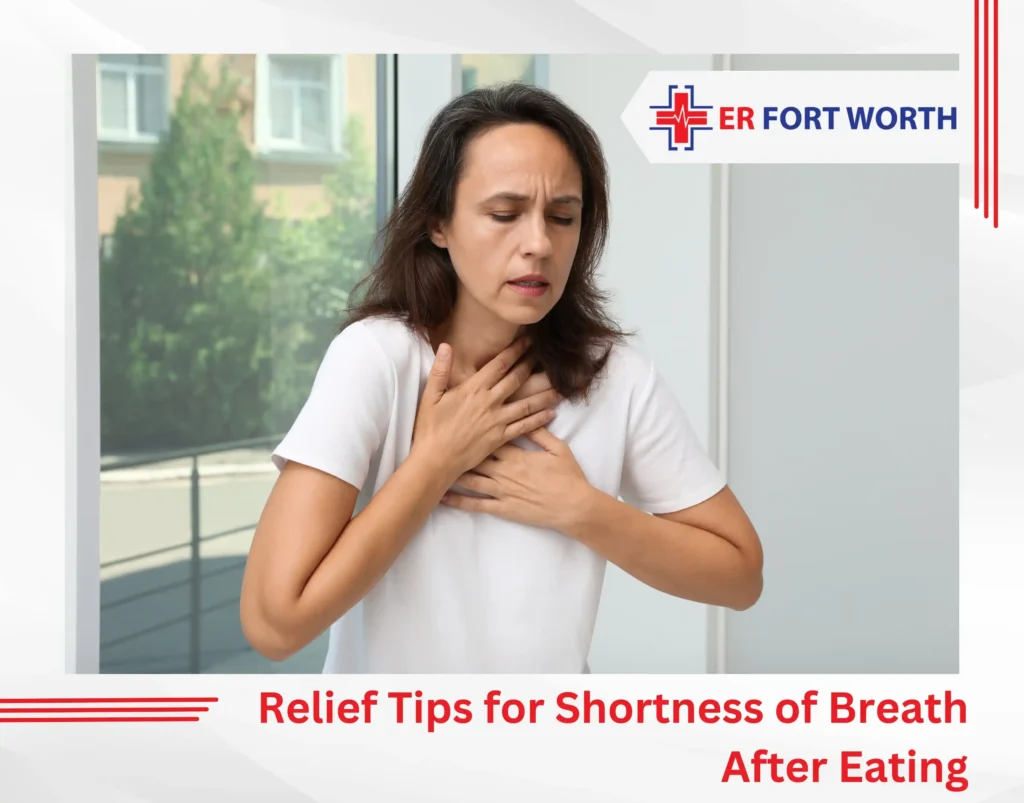
Here are lifestyle and dietary habits that can help ease symptoms:
- Practice mindful eating: Take time to chew thoroughly and savor your meals. Avoid eating while distracted.
- Sit upright while eating: Posture matters. Sitting tall improves digestion and lung expansion.
- Avoid eating before bedtime: Give your body time to digest before lying down.
- Stay hydrated: Water aids digestion and prevents bloating that can restrict breathing.
- Limit carbonated drinks: Choose still water or herbal teas over soda and fizzy beverages.
- Incorporate light post-meal activity: A gentle walk can aid digestion and prevent bloating.
- Practice breathing exercises: Techniques like diaphragmatic or pursed-lip breathing can improve lung efficiency.
When to See a Doctor for Shortness of Breath After Eating
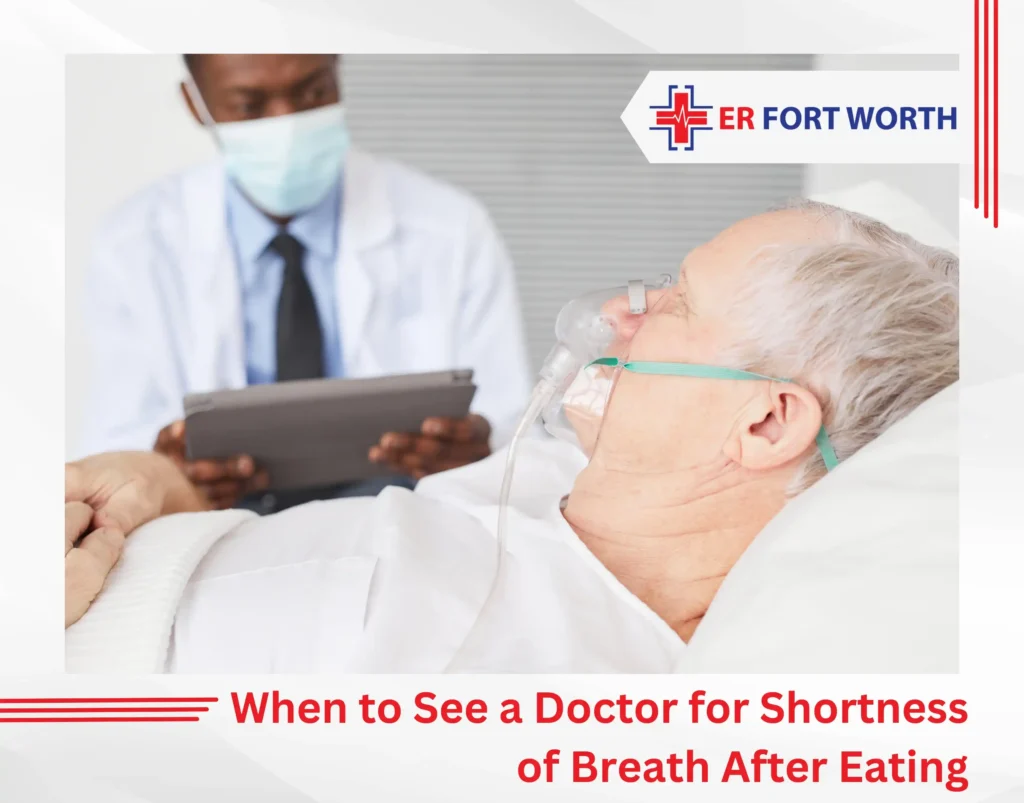
Occasional breathlessness after a big meal may not be alarming. However, frequent or severe shortness of breath, especially if it occurs with other symptoms, warrants a medical evaluation.
Watch for:
- Chest discomfort or pain
- Heart palpitations
- Swelling in the legs or ankles
- Dizziness or fainting
- Persistent coughing or wheezing
- Known heart or lung conditions
Early diagnosis can help rule out serious issues and lead to a tailored treatment plan.
FAQ
1. Is it normal to feel short of breath after eating?
Occasionally, yes—especially after large meals. But if it’s frequent or affects your daily life, consult a healthcare provider.
2. Can GERD cause shortness of breath after eating?
Yes, GERD may irritate the esophagus and airways, contributing to post-meal breathlessness.
3. What foods should I avoid to reduce symptoms?
Avoid fried, fatty, spicy, or acidic foods, along with carbonated beverages. Identify personal triggers through a food diary.
4. Can anxiety cause shortness of breath after eating?
Yes, stress and anxiety can amplify physical symptoms, including shallow breathing after meals.
5. When should I seek medical attention?
If you experience ongoing or severe symptoms, especially with chest pain, fatigue, or known heart/lung conditions, get evaluated immediately.
6. Are there exercises that can help?
Breathing techniques such as pursed-lip or belly breathing can help train your lungs and improve post-meal comfort.
7. Does posture affect shortness of breath after eating?
Absolutely. Poor posture can restrict your diaphragm. Always sit upright during and after meals for at least 30 minutes.

